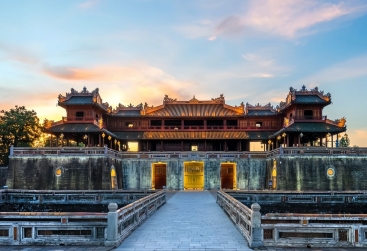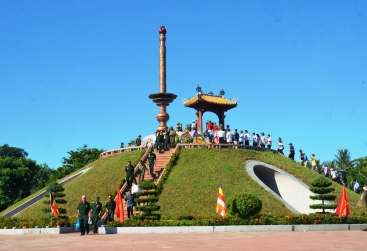Filming of the $150 million blockbuster in Vietnam is a chance to show the world the country’s unique beauty after a similar chance 20 years ago slipped away.

Filming of Kong: Skull Island will take place in Ninh Binh and Quang Binh provinces and Ha Long Bay…
For many decades, Hollywood movie-makers felt there were too many hurdles to overcome to film in Vietnam. There was, of course, the lingering shadow of the years of war in the country, in addition to a complicated and opaque approval process. The most notable example of the latter was when approval for filming scenes for the James Bond movie Tomorrow Never Dies was suddenly revoked shortly before the cameras began to roll.
Fast forward to 2016 and the warm welcome being shown the cast and crew of the new Kong: Skull Island movie, and it seems like Vietnam could be set for a new era of international film production.
A 20 year obsession
Not long after the reunification of Vietnam in 1975, Hollywood started producing movies about the conflict. According to IMDb, from 1975 to the early 1990s, about 70 Hollywood movies were made on the Vietnam War. These included pictures from prominent directors such as Francis Ford Coppola with Apocalypse Now (1979), Stanley Kubrick’s Full Metal Jacket (1987), and former soldier and director Oliver Stone’s trilogy Platoon (1986), Born on the Fourth of July (1989) and Heaven and Earth (1993).
The depiction of the war in Vietnam from the perspective of Americans was obviously a sensitive topic during an era when there was no formal diplomatic relations between the two countries. At the time, no crews from the US were permitted to film in Vietnam. Consequently, film-makers moved to other Southeast Asian countries with a similar climate and terrain to Vietnam. Apocalypse Now and Platoon were filmed entirely in the Philippines, and the Vietnam scenes in Born on the Fourth of July were also filmed there.
In early 1990, Oliver Stone flew to Vietnam to seek permission to film the third movie in his trilogy – Heaven and Earth. At the time, Stone was fresh off receiving the Best Director Oscar for Born on the Fourth of July.
The story for Heaven and Earth-centered around the life of a Vietnamese woman during the war. There were some sensitive details that were ordered by authorities to be removed from the script. Eager to film in Vietnam, Stone agreed and yet the production was still not approved. In the end, the filming was moved to another location, with Thailand this time standing in for Vietnam.
The film ultimately was not well received at the box office and signaled the end of a two-decade long fixation of American film-makers re-examining the conflict.
No thank you Mr. Bond
Over the next ten years, three foreign productions filmed in Vietnam under the direction of French, British and Australian filmmakers: Indochine (1992), The Lover (1992), and The Quiet American (2002). Thanks to these films, although admittedly they were not blockbusters, Vietnam was for the first time presented on the big screen in Western cinemas as a land of lush tropical scenery.
However, in 1995 Vietnam came to the attention of the producers of the hugely successful James Bond films who were preparing to shoot the 18th installment of the franchise, Tomorrow Never Dies. The memorable action sequence in which actors Pierce Brosnan and Michelle Yeoh race across rooftops on a BMW motorcycle was due to be filmed on location in Ho Chi Minh City. Ha Long Bay was also scheduled to be the location for other scenes.
After a lengthy application process, the crew was permitted to film in Vietnam in early 1997. They planned to prepare for three months, film for three weeks and spend US $5 million for the shots in Vietnam.
However, on 5 May 1997 an urgent note was sent from the Cinematography Department of Vietnam to the crew requesting them to cease immediately all activities in the country. Vietnam’s Ministry of Culture at the time released a press statement announcing the withdrawal of all consent, saying: “Vietnam’s movie industry is newborn and not yet equipped well enough for a blockbuster as big as James Bond.” The turn of events shocked the Asian film scene as it was thought no country in the world could afford to refuse 007 the way Vietnam did.
The abrupt retraction forced the Bond crew to change the location of filming to Thailand at the last minute. According to Thailand’s Cinematography Department, in 2015, Thailand raked in $89 million from 274 foreign film productions, 63 of which were feature-length films. Meanwhile, not a single international film crew came to Vietnam for nearly 10 years, even as the country’s natural beauty has drawn millions of tourists.
New Promised Land for film makers.
Recently, things have begun to change and the beauty of Vietnam is once again charming foreign film producers. In 2014, more than 10 crew from the movie Pan quietly came to Vietnam to film for two weeks. They shot footage at Hang En Cave, Ha Long Bay and Trang An in Ninh Binh Province that would form the basis of the fantastical scenery in the movie. Even though the movie was not a commercial success, the shots of the country’s enchanting landscape began to attract more film makers to Vietnam.
In October 2015, director Jordan Vogt-Roberts came to Vietnam and spent more than a month travelling across the country to inspect feasible sites for the blockbuster Kong: Skull Island. The director has said he could not help being in awe of the country and was determined to render Vietnam on the screen the same way New Zealand is used as a backdrop for the Lord of the Rings films.
“Jurassic Park’s audience all remembered Hawaii, Lords of the Rings’ New Zealand, all because of the unforgettable scenes of these countries,” Vogt-Roberts said.
“Vietnam possesses mountains and caves whose beauties can be found only in artworks of surrealism. I want Vietnam on screen to stand out, so impressive that a global audience is struck by its sheer splendor.”
On February 18, around 120 crew members plus the all-star cast and 40 tonnes of equipment touched down in Vietnam. A few days later they moved to Quang Binh to begin shooting the first scenes. The next locations will be in Ninh Binh and Quang Ninh. The Vietnam locations will represent a fictitious island that is the birthplace of the giant gorilla Kong. So far, this is the biggest-budgeted movie to be filmed in Vietnam.
Kong: Skull Island marked a change in the perspective of global filmmakers towards Vietnam. Since the producers’ initial proposal to film in the country, the Ministry of Culture, Sport and Tourism has expressed its endorsement of the project. Vietnam’s Prime Minister then requested related ministries such as Finance, Transportation, Police, and Communication to support and cooperate with the crew during the filming process.
After filming on Kong: Skull Island wraps, Vietnamese authorities will have more work to do. They need to use this opportunity to vigorously promote Vietnam to the world.
The country that used to appear only in Discovery or National Geographic programs for its intrinsic beauty is now becoming the backdrop for well-crafted big-screen tales. The beauty once only available to the eyes of beholders has now been captured by professionals and enhanced with the power of cutting-edge visual effects.
So it might be a good idea to book your flight soon, rather than wait and regret later the price it may take to gain access to the place that awed you at your local theater.
Resource: Vnexpress International
Original article: http://e.vnexpress.net/news/travel-life/culture-arts/kong-skull-island-gives-vietnam-a-global-stage-3361304.html













